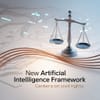The Center for Civil Rights and Technology has introduced a new framework to guide the development and deployment of artificial intelligence (AI) systems, prioritizing civil rights and fairness. This framework, known as the Innovation Framework, aims to ensure AI systems protect and promote human rights, particularly for marginalized communities.
The framework is built on four foundational values that center civil and human rights in the design process, consider AI as a tool rather than a solution, prioritize human impact and oversight, and ensure AI is environmentally sustainable. To implement these values, the framework outlines ten lifecycle pillars that provide specific actions for companies to take.
The Innovation Framework seeks to promote trustworthy and better AI technologies that stand out globally. By integrating these values and pillars, companies can build AI systems that truly work for everyone, especially in critical areas like healthcare, housing, law enforcement, education, and employment.
Leaders in the field have expressed support for the framework, emphasizing that AI can only be innovative if it's trusted, and fairness and safety cannot be afterthoughts. This initiative is part of a broader effort to ensure AI systems are developed and deployed in ways that respect human rights and promote social good.


